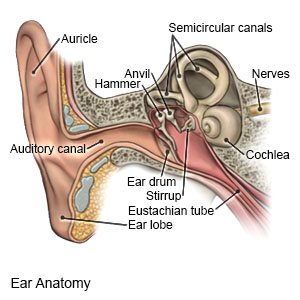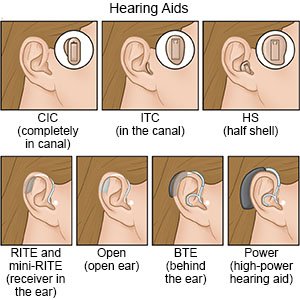Hearing Loss in Children
Medically reviewed by Drugs.com. Last updated on Aug 4, 2025.
What is hearing loss?
Hearing loss means your child has trouble hearing or he or she cannot hear at all in one or both ears. Hearing loss can happen suddenly or slowly over time.
What are the types of hearing loss?
- Conductive hearing loss occurs when there is a problem with your child's outer or middle ear. Sound waves cannot reach his or her inner ear. This type of hearing loss may be caused by earwax buildup, fluid, or a punctured ear drum. It can often be treated by correcting the cause of the problem.
- Sensorineural hearing loss is caused by damage to parts of the inner ear. Sensorineural hearing loss usually cannot be cured.
- Mixed hearing loss includes both conductive and sensorineural hearing loss.
- Central auditory processing hearing loss means your child's brain has trouble processing sounds correctly.
 |
What causes hearing loss?
The cause may not be known. Any of the following may cause hearing loss:
- Blockage in the ear caused by earwax buildup, swelling, or an object such as a small toy
- Head injury
- Medical conditions such as ear infections, meningitis, measles, chickenpox, or otosclerosis
- Increased fluid in the inner ear
- Medicines that damage the ears such as a type of antibiotic called streptomycin
- Premature birth or low birth weight
- Family history of hearing loss
- Infections in the mother during pregnancy, such as herpes or rubella
What are the signs and symptoms of hearing loss in children?
- Your baby may not notice sounds around him or her, such as a voice, a rattle shaking, or a loud noise.
- Your child's speech does not seem normal for his or her age. Your child is old enough to talk, but he or she is not saying words yet.
- Your child sits close to the TV with the volume up very high.
- Your child watches the faces and lips of others closely when they speak.
- Your child often asks you or others to repeat what was said.
- Your child does not respond to someone when the person is not in clear view.
How is hearing loss diagnosed?
The healthcare provider will ask you about your child's hearing loss and examine his or her ears. Your child may need any of the following:
- An auditory brain stem response test measures hearing loss in babies younger than 6 months. Patches are placed on your baby's head and sounds are sent to his or her ears through earphones. Your baby's brain response is measured.
- An otoacoustic emissions test records sounds that come from your child's inner ear when the cochlea is stimulated. A probe is used to stimulate the cochlea using different sounds.
- Audiometry is a test used to measure how well your child can hear different sounds. The type of audiometry your child will receive depends on his or her age. A baby's reaction to the sounds may be observed. A light or toy may appear every time your baby responds to the sound. A young child may be asked to touch or move a toy every time a sound is heard. Children older than 5 years will be asked to press a button or raise a hand when the sound is heard. Each ear will be tested separately. Another device will be placed on the bone behind your child's ear. The device will test how well vibration moves through the bones. This is called bone conduction.
- Tympanometry is a test used to find hearing problems in the middle ear. A device is placed into your child's ear. The device creates pressure changes that make his or her eardrum vibrate.
How is hearing loss treated?
Treatment depends on the cause of your child's hearing loss. Removal of earwax or treatment for any medical conditions that have caused his or her hearing loss may be needed. Your child may need any of the following:
- A hearing aid is a small device that fits inside your child's ear and helps him or her hear better. Your healthcare provider can help you choose a hearing aid that is right for your child.

- A cochlear implant is a tiny device that is put into your child's cochlea (part of his or her inner ear) during surgery. This device can only be used for sensorineural hearing loss.
- Assistive listening devices (ALDs) pick up sound and send it through earphones or a headset. ALDs can help your child hear better when he or she is in a place with background noise. Examples include classrooms or theaters. ALDs can be used alone or with hearing aids or cochlear implants.
- Surgery may be needed if your child's hearing loss is caused by otosclerosis. Surgery may also be done to place small tubes in your child's ear. These tubes help drain fluid and help prevent ear infections.
- Therapy may be needed to help a young child learn to speak or communicate with sign language. Hearing loss can delay your child's speech and language development. You may also need to learn sign language so you can communicate with your child.
How can I help my child manage his or her hearing loss?
- Keep your child away from loud noises to help prevent more hearing loss. This includes fireworks, loud music, motorcycles, and power tools.
- Face your child when you speak to him or her. When you are in a group setting, have your child sit where he or she can clearly see the faces of the people who are speaking. Ask people not to speak loudly or shout when they speak to your child. People should speak using their usual tone and volume.
- Keep all appointments with your child's healthcare providers. Your child's hearing loss may change as he or she grows, so he or she will need regular appointments to check for changes.
When should I call my child's doctor or audiologist?
- Your child has fluid, pus, or blood leaking from his or her ear.
- Your child has sudden, severe hearing loss.
- Your child has a fever.
- Your child has ear pain that is getting worse.
- Your child has ringing in his or her ears or dizziness that will not go away.
- You have questions or concerns about your child's condition or care.
Care Agreement
You have the right to help plan your child's care. Learn about your child's health condition and how it may be treated. Discuss treatment options with your child's healthcare providers to decide what care you want for your child. The above information is an educational aid only. It is not intended as medical advice for individual conditions or treatments. Talk to your doctor, nurse or pharmacist before following any medical regimen to see if it is safe and effective for you.© Copyright Merative 2025 Information is for End User's use only and may not be sold, redistributed or otherwise used for commercial purposes.
Learn more about Hearing Loss
Treatment options
Care guides
Further information
Always consult your healthcare provider to ensure the information displayed on this page applies to your personal circumstances.
